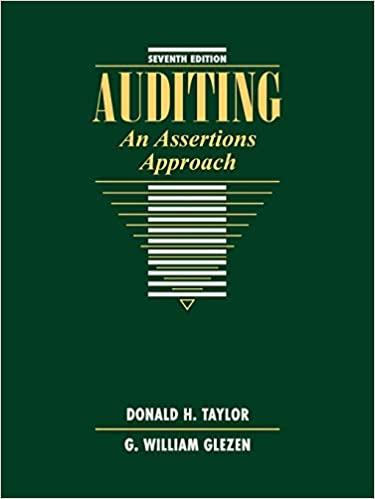Question
1. Your company, which uses the perpetual method, purchases inventory for $7,000 on account, but before paying the invoice returns damaged goods for a $650
1. Your company, which uses the perpetual method, purchases inventory for $7,000 on account, but before paying the invoice returns damaged goods for a $650 credit. What is the journal entry to record this return? a. Purchase Returns and Allowances 650 Accounts Payable 650 b. Accounts Payable 650 Inventory 650 c. Accounts Payable 650 Purchase Returns and Allowances 650 d. Accounts Payable 650 Cost of Goods Sold 650 2. On March 15, EtCo, which uses the perpetual method, sells on account $50,000 of computers for which it had paid $25,000. That same month, 20% of the computers are returned before the buyer pay the invoices. What is the journal entry to record these returns? a. Sales Returns 10,000 Accounts Receivable 10,000 Inventory 5,000 Purchase Returns 5,000 b. Sales Returns 10,000 Accounts Receivable 10,000 c. Sales Returns 10,000 Inventory 5,000 Accounts Receivable 10,000 Cost of Goods Sold 5,000 d. Sales Returns 10,000 Gross Profit 5,000 Accounts Receivable 5,000 3. Recorded purchases of inventory affect: a. only the income statement. b. only the balance sheet. c. both the balance sheet and the income statement. d. none of the above. 4. In its first year of operation, Flip Co, which uses the perpetual method and records purchases at net, buys two lots of sweaters, 1/10, n/30: the first lot on March 10 for $4,000, paying the invoice on March 16; the second lot on June 25 for $2,000, paying the invoice on July 9. If no sweaters are sold from March through July, how will these purchases appear Flip Cos income statement for the year ended July 31? a. No effect, because there were no sales. b. As a loss of $20 c. As a loss of $40 d. As a loss of $60 5. Your company, which uses the perpetual method, does a year-end physical count of inventory. If there has been shrinkage, the adjustment will include: a. a debit to an asset account. b. a credit to an income statement account. c. a credit to an asset account. d. a debit to a liability account.
Step by Step Solution
There are 3 Steps involved in it
Step: 1

Get Instant Access to Expert-Tailored Solutions
See step-by-step solutions with expert insights and AI powered tools for academic success
Step: 2

Step: 3

Ace Your Homework with AI
Get the answers you need in no time with our AI-driven, step-by-step assistance
Get Started


